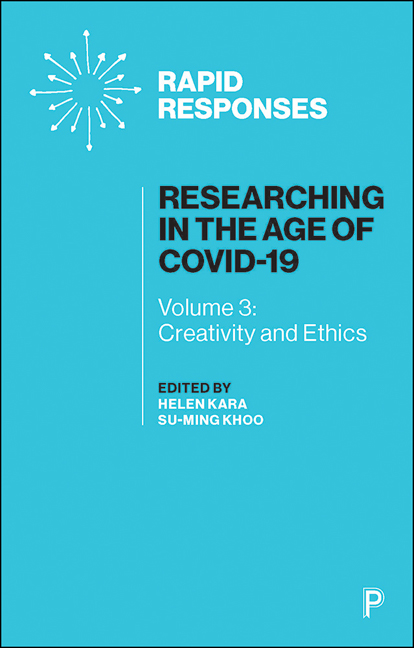6 - COVID-19 Research Crisis Management for a Human Research Ethics Research Project in Fiji and Tonga
Published online by Cambridge University Press: 23 March 2021
Summary
Background
My research project “Integrating indigenous principles of human research ethics: The case of two Pacific island nations” was in progress when the COVID-19 pandemic was declared in early 2020. It focuses on culturally appropriate and ethical human research in the Republic of the Fiji Islands (Fiji) and the Kingdom of Tonga (Tonga) in the South Pacific. Talanoa, an informal talk between persons or among people to share stories, ideas and emotions (Vaioleti, 2016), which is a culturally embedded qualitative research method, was employed (Nabobo-Baba, 2008; Fua, 2014; Fa’avae et al, 2016). COVID-19 enforced a change from face-to-face talanoa to online talanoa, presenting research and cultural challenges that had to be resolved in order to continue the study.
I, the principal investigator, am a Tongan woman and a long-term resident and worker in Fiji. We drew on a critical ethnographic theoretical perspective (Madison, 2011) to guide the enquiry, while a case study (Yin, 2009) qualitative research design was employed to explore priorities for the development of Human Research Ethics (HRE) in Fiji and Tonga. Two case studies were being conducted in this research project considering the incorporation of iTaukei (indigenous Fijian) cultural beliefs and traditions into the governance mechanism of HRE in Fiji. The second case study covers similar content, but in Tonga.
The ethno-geographic divisions of the Pacific Islands are Melanesia, Polynesia and Micronesia. Fiji is in Melanesia. However, Fiji's population is multicultural (Mohamed et al, 2018; Tagicakiverata and Nilan, 2018) and some Fijians have Polynesian ancestry (Foster and West, 2016). The majority of the Fijian population are iTaukei. The iTaukei practices are strongly guided by indigenous cultural beliefs which are consolidated into the holistic concept of Vanua. Elements of Vanua include relationships amongst people, their physical environment, lotu (religious beliefs), respect of ancestors and customary laws and mana, the power that derives from these relationships. Vanua integrates these relationships as one body (Ravuvu, 1987; Long, 2017), foregrounding the virtue of selflessness. Other important characteristics or virtues include veidokai (mutual respect), duavata (solidarity), vakarokoroko (respect), dauvosota (tolerance) and veinanumi (being considerate).
- Type
- Chapter
- Information
- Researching in the Age of COVID-19Volume III: Creativity and Ethics, pp. 61 - 69Publisher: Bristol University PressPrint publication year: 2020



